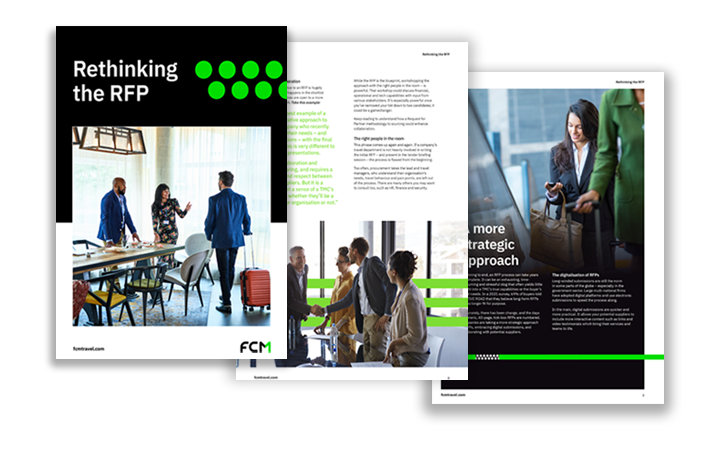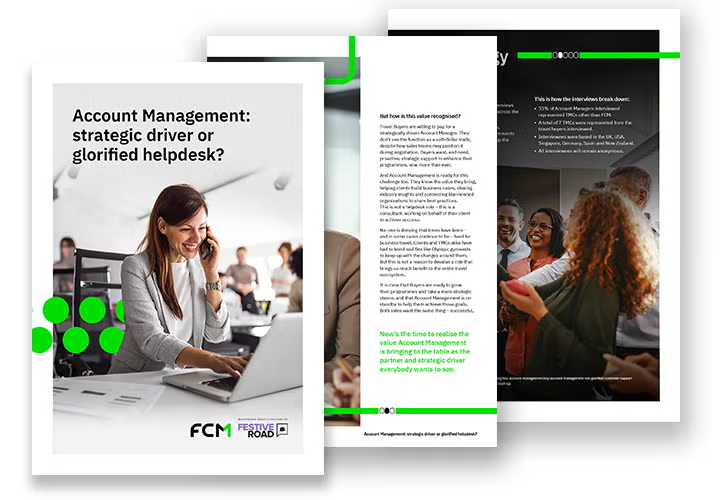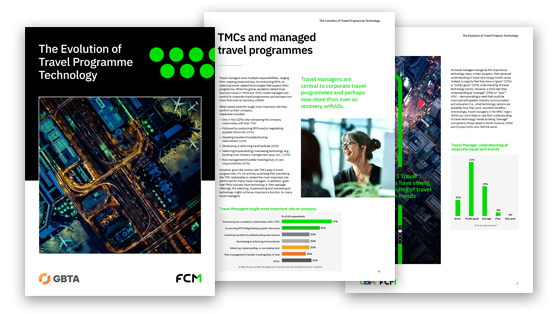Mastering the essentials: your corporate travel management handbook

Business travel management has never been a walk in the park. But in the last few years, the corporate travel landscape has faced a lot of changes. Today's business travellers seek simple self-bookings and a broader range of travel options. Meanwhile, organisations like yours aim to minimise costs and maximise their ROI on business travel.
How can you find the compromise that can help you achieve it all? By establishing a managed travel programme and leveraging modern travel management software.
So, whether you’re looking to finetune your existing corporate travel processes, or you’re designing a new system from scratch, our complete guide to corporate travel management will help you achieve all of these goals and more.
What is corporate travel management?
In short, travel management is the framework that organisations implement to oversee and facilitate their business travel processes. While it is about controlling, tracking, and reporting on your company’s travel expenses, it also involves everything from setting up approval protocols to supporting your travellers on the road.
Some organisations will outsource their business travel management to a specialised travel management company (TMC). Others will handle it in-house with a dedicated travel manager or travel management team. Sometimes, it may even be a collabor/node/6153ative effort from both!
But regardless of whether travel is managed externally or internally, most businesses also rely on a corporate travel platform to track travel expenses, identify out-of-policy bookings, and perform other vital functions to help you meet your business goals.
What is procurement in business travel?
Travel procurement enables employees to carry out business trips by booking flights, hotels, trains, and car rentals. This process involves more than just securing (or rather, procuring) the most cost-effective rates; it also means finding options that prioritise your travellers’ satisfaction, safety, and well-being.
Naturally, this necessitates intricate negotiations, strategic contracting, and continuous adaptation to the ebbs and flows of the corporate travel industry.
Many different departments may handle this procurement, from human resource managers to dedicated procurement professionals.
Challenges facing corporate travel procurement
No process worth doing comes without its own set of challenges – and travel procurement is no exception. The ever-changing nature of the travel industry presents hurdles such as:
- Dynamic Pricing: The ebbs and flows of the corporate travel market demands vigilant management to handle fluctuations in expenses.
- Market Awareness: Procurement specialists must stay attuned to market trends, adjusting strategies to navigate the dynamic nature of the travel industry.
- Employee-Centric Considerations: Cost considerations should be balanced with employee needs, including travel times, convenience, and well-being.
- Task Performance and Compliance: Ensuring travel choices adhere to travel policies while also aligning with your employees' ability to perform tasks (red-eye flights might be cheaper, but they don’t exactly motivate employees).
Navigating negotiations with finesse
When negotiating hotel rates or transportation costs, make sure to arm yourself with the following information:
- Accurate, real-time data on your organisation’s travel patterns, including insights into your travel volumes and travel spend
- Current market dynamics in the travel industry
- A thorough understanding of your travellers, their preferences, and what is important to them
- An accurate picture of your company culture
- Analysis of past contracts
Once you know the wants and needs for your travel management programme, you can begin your bid for your ideal supplier contracts.
Decoding RFI and RFP
- RFI (Request for Information): This is a request for general information from potential vendors, offering a broad overview of their capabilities and services.
- RFP (Request for Proposal): This announces project and/or business needs, describes them, and overall acts as an open request for bids from travel vendors. In some cases, it is used to renegotiate existing contracts. For others, it is created when a preferred supplier has been identified.
Both of these documents are ideal for getting the best contracts for group bookings, procuring a TMC, and securing the best airline negotiated deals and hotel programmes…but writing them up can be more than a little tedious. Want to skip the process altogether? Let our specialists in travel solutions focus on the details so you can stay engaged with what matters.

Download your guide to rethinking corporate travel RFPs with chapters including:
- The now: a more strategic approach
- Common pitfalls in travel RFPs
- Ten steps to a rock-solid RFP
- Advice from FCM’s team
- Request for Partner: a collaborative alternative
Impact of travel policy compliance
So, you’ve secured the best rates…but that’s only helpful if your travellers know to utilise them.
Remember: your travel policy serves as the framework for booking business trips. As your organisation grows and supplier contracts evolve, procurement teams must continually adapt and update corporate travel policies to reflect these changes. This agility keeps your business ahead of the curve, achieving cost savings and aligning travel practises with evolving business needs.
Does your travel policy need an upgrade? Put your travel policy to the test with our Global Policy Benchmarking Tool.
Our tool benchmarks travel policies from different customers and industries. See how your current travel policy compares and find out where you can make improvements to take your travel programme to the next level.
The demand for automation
Time and effort are precious commodities.
Unfortunately, no matter how much time and effort you spend writing (and re-writing) your travel policy, your travellers will probably bypass documentation to touch base with you. That means expending more time and more effort constantly answering the same questions – or worse – fixing easily avoidable mistakes.
This is where automation steps in as the game changer. By seamlessly integrating your travel policy with a holistic travel management system, you not only boost compliance, but save yourself from constant queries.
So, what is a corporate travel management system?
The short answer: These systems are made of different tools that work together to help companies manage travel.
The long answer: This is a holistic, agile travel tech stack that consists of interdependent software solutions that work together seamlessly to provide end-to-end travel management. These tools work together to oversee, regulate, and coordinate the travel and expenses of your travelling employees.
The result? You streamline approvals, stay connected to employees wherever they are, improve business travel compliance, and overall just make corporate travel a little less painful.
That being said, not all travel technology is created equal.
5 signs you need to elevate your travel technology
Wondering if your current software truly serves your organisation? Start by asking yourself these questions:
1. Does your technology help you control travel costs?
An integrated suite of travel technology should simplify travel and expense management by giving the procurement or travel manager visibility of company-wide travel costs and to manage preferred supplier agreements. The right combination of a simplified reporting & analytics tool and experienced travel providers should also enable you to benchmark your travel programme against that of your competitors.
2. Does your tech provide a platform that keeps travellers connected?
A positive business travel experience is about being connected. In addition to 24/7 support, your technology should allow travellers to access and manage their reservations across any device, enabling them to make changes when necessary and to receive relevant notifications, such as for flight delays. Some apps also allow for information to be accessed offline, avoiding excessive data charges and reducing costs for your organisation.
3. Do your current reporting capabilities help you stay on top of your sustainability goals?
With the International Air Transport Association’s (IATA) goal of net-zero CO2 emissions by 2050, sustainability concerns are at the forefront of corporate travel. Your online booking tool (OBT) and reporting dashboards should include functionalities that enable your organisation to easily calculate your carbon footprint, offset those emissions, and report on the results.
4. Are travel risk management processes automated?
Your risk management solutions should give you direct access to crisis control centers across the world. Technology should integrate risk management, booking, and reporting systems so that travellers’ locations can be tracked and support can be given in real-time. This would also manage concentration risk by highlighting instances where too many employees are travelling on the same flight.
5. Does it guide self-bookers to the most efficient in-policy bookings?
A simple browser plugin can shoot over a push notification at any point of the booking process to remind travellers of your travel policy as they book trips. This lets you act as a guide for your travellers without wasting time hovering over everyone’s shoulders.
Unlock your programme’s potential with the FCM Platform
Watch how the FCM Platform can supercharge your travel programme. And, when you’re ready, you can book your comprehensive demo below.
Booking challenges
Your meticulously crafted travel policy is a roadmap designed to benefit both your business and the individuals powering it. However, the efficacy of this roadmap depends on its utilisation.
Insightful reporting that is accompanied by expert analysis also mitigates common travel pain points around:
- Traveller visibility
- Travel risk management
- Ability to demonstrate ROI
- Booking leakage
- Data accuracy, or “dirty data”
But what are the hallmarks of great travel reporting and how can businesses improve their reporting capabilities for strategic long-term programme enhancement?
3 travel management reporting essentials
Below are some common key attributes of best-practise travel reporting and how they can help your business overcome commonly experienced obstacles.
1. Consolidated Reporting
Booking leakage is a huge area of concern for many procurement departments. Having consolidated travel data with a single TMC positions companies in a much better position to target booking, supplier, or channel leakage as all the data is centralised. Consolidated reporting enables you to measure the missed savings from leakage, where the leakage is coming from, and who or what division needs support in this area.
2. Benchmarking
Benchmarking your travel programme against other businesses in your sector or with similar sized travel programmes and spend is valuable for your approach to creating long-term cost efficiencies.
Having your TMC provide quantifiable data that summarises whether you’re generating savings from your pre-negotiated rates or receiving the most competitive supplier deal when compared to organisations of a similar size can provide an important business travel programme health check.
Broad benchmarking capabilities against all sectors will arm you with actionable insights in terms of which suppliers you should be negotiating more strategically with, and what discount levels your company may be eligible for.
3. AI
Designed to provide a more robust and customer-centric experience for travel managers, the AI reporting capabilities offers a unique way to visualise data simply by posing a question using natural language.
With FCM’s AI powered reporting, you can:
- build reports with more than 15 chart options
- Build reports with custom calculations
- Interpret alternate terms when a user is making a request – You can ask “What is my CPM?” or “What is my Cost Per Mile” and get the same results.
- Offer suggestions that allow users to bring up key metrics quickly
- Offer hints as users are typing questions and will also provide the optimum visualisation based on the question asked
- Turn data into actionable insights
Chapter 4: Travel Savings
Loyalty pays
Understanding the dynamics of the corporate travel industry is crucial, as various travel service providers, such as hotels, car rental agencies, and airlines, place significant value on fostering strong relationships with businesses. Recognising that corporate travel is a substantial sector, these providers acknowledge the rewarding nature of loyalty.
Corporate rates, whether fixed or subject to negotiation, encompass a spectrum of discounts:
- Corporate hotel rates
- Corporate airfares (reminiscent of frequent flyer benefits)
- Corporate car rental
- Rideshare corporate accounts
Embracing corporate travel discount programmes for your company brings tangible advantages:
- Cost Savings – The financial impact of corporate rates translates into substantial cost savings for your company. A well-designed programme not only provides monetary benefits but also empowers you with the capability to monitor and control your expenditure effectively.
- Convenience – Corporate travel discount programmes alleviate the complexities associated with organising and planning business travellers' trips. By furnishing tools that simplify booking and monitoring processes, these programmes contribute to a seamless and hassle-free travel management experience.
Agent vs. DIY Booking
Self-Booking
| Pros | Cons |
| Online booking platforms are available round-the-clock, providing flexibility to users who can make reservations anytime. | Booking independently may require more time and effort, especially for complex itineraries or group travel. |
| Online platforms offer a vast array of travel products, accommodations, and tour operators to choose from. | Unlike travel agents, online platforms may lack personalised assistance or recommendations tailored to individual needs. |
| Self-booking allows users to see direct costs without intermediaries, promoting transparency. | Self-bookers might miss out on exclusive deals, upgrades, or perks that travel agents can secure. |
| Travellers have full control over their plans, choosing flights, accommodations, and other details based on personal preferences. | In case of issues or emergencies, self-bookers may have to rely on customer support from the respective travel providers. |
Corporate Travel Agents
| Pros | “Cons” Debunked |
| Travel agents, or travel consultants, offer expert insights in planning and coordinating trips. | Rumour: Many travel agents operate during specific office hours, which may be less convenient than online booking available 24/7. Reality: At FCM, Our teams are here 24/7 to buoy your travel arrangements and keep your crews on course, even to the most remote locations. |
| Agents often have access to special rates, upgrades, and perks that may not be available to the general public. | Rumour: Agents may be incentivised by commissions, potentially leading to biased advice favouring certain airlines or hotels. Reality: Don’t take our word for it – here’s what the travel manager of a well-known Fortune 100 insurance company has to say about our services: “Not only did FCM provide comprehensive, customised materials and sessions, they consistently took the time to listen and understand our culture, and then flexed to align with our needs.” |
| Travel agents can save time for busy professionals by handling all aspects of the booking process. | Rumour: Some agencies, especially smaller ones, may have limited inventories compared to the vast options available online. Reality: With more than 20 years’ history, global reach, and team experience, FCM has all the specially negotiated deals and exclusive content you could ask for, including advancements with NDC and TPConnects. |
| A good travel agent can provide a personalised and hands-on service, catering to individual preferences and needs. | Rumour: Travel agencies often charge fees for their services, and the overall cost may be higher than to book travel independently. Reality: By bypassing the TMC, you might think you're saving money, but you’re forgoing group rates that could pad your travel spend wallet. Not to mention human errors come with a price tag. |
| Travel agents can efficiently organise group trips, ensuring all requirements are met. | |
| Agents can manage changes, cancellations, and find flexible options within budget constraints. |
|
Agents can manage changes, cancellations, and find flexible options within budget constraints.

Account Management: strategic driver or glorified helpdesk?
In today’s world, are Account Managers strategic drivers, or just glorified helpdesks? With independent insights from FESTIVE ROAD that explore the evolving role of the Account Manager. Where do you stand on this hot topic? Read more in our latest taboo paper.
Travel risk management: Your duty to your travellers
Corporate travel risk management (TRM) involves identifying, assessing, and mitigating potential risks associated with business travel. It's not just about keeping your employees safe; it's also about protecting your organisation's reputation and bottom line.
You have a duty of care (DOC) to your travelling employees. For the most part, effective TRM relies on four key elements:
- Pre-travel risk assessments
- Informed business travel
- Traveller briefs
- Travel safety technology, like a robust mobile app
Travel is risky. Travel risk management doesn’t have to be. Check out our travel risk management hub for additional insights.
Traveller Wellness: Going Beyond Obligation
Prioritising traveller well-being extends beyond your duty of care obligations – it’s a strategic investment.
Remember: Happy employees are productive employees. Consider these often-overlooked incentives that enhance traveller experiences, and in turn, boost employee retention while elevating your ROI on corporate travel:
- Flexible Itineraries – Grant a 24-hour window for personalised departure and return schedules.
- Accommodation Standards – Regularly audit accommodations, ensuring comfort and eliminating noisy stays.
- Health-focused Amenities – Prioritise hotels with gyms and wellness centres, promoting healthy choices for your road warriors.
- Mental Health Support – Offer access to mental well-being apps and resources, acknowledging the stresses of travel.
- Personalisation – Recognise diverse employee needs, tailoring wellness approaches to both reasonable accommodations and individual preferences.
- Breaks Between Trips – Implement breaks of at least two days for employees travelling consecutively for more than five days.
- Hello Bleisure – Embrace the "Business+Leisure Balance," allowing half a day of “play” after every three days of work.
- Corporate Cards: Integrate corporate credit cards for seamless financial transactions.
The alternative way of doing business travel
Corporate travel is about so much more than booking flights. That’s why FCM Travel offers a breadth of corporate travel services through our talented teams and innovative technology.
Our approach to end-to-end business travel brings control to your corporate travel programme and delivers value through savings, efficiency, and productivity.
Ready to discover a new travel partner? Let’s talk.

